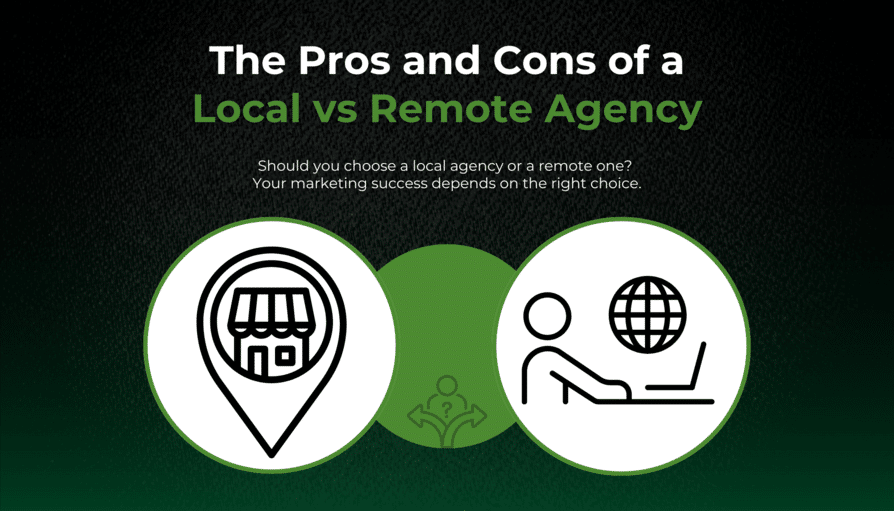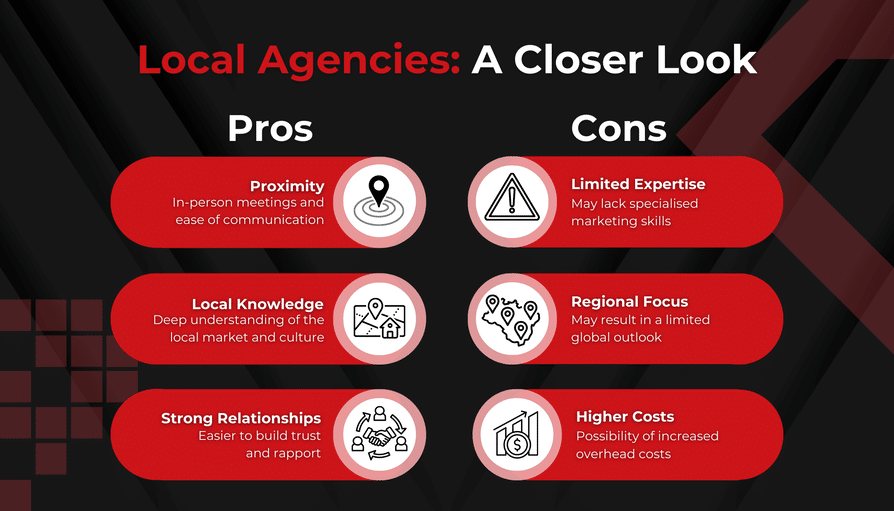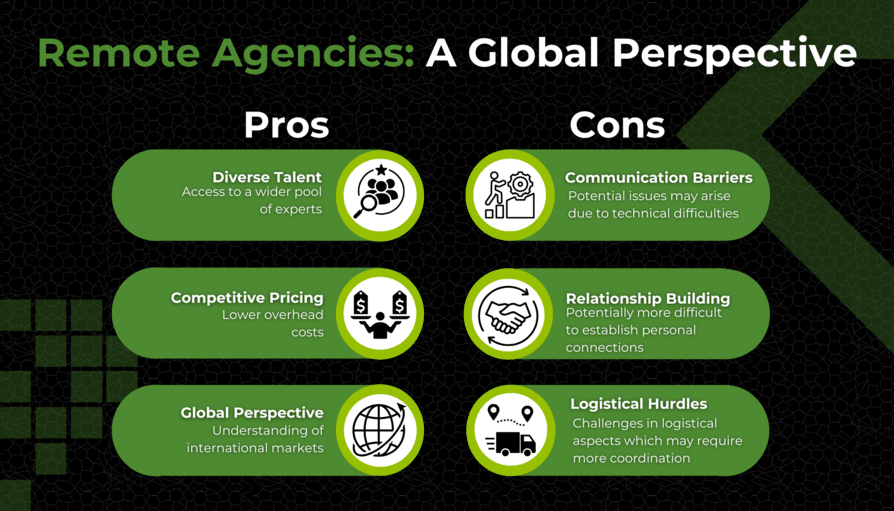When choosing a marketing agency, one of the first questions you will likely ask yourself is: should I go with a locally based business or a remote agency? (For the purposes of this article, “local” refers to an agency located within your city or region, while “remote” refers to an agency located elsewhere in South Africa, or even internationally.)
A local agency might have a better grasp of your immediate target audience, while a remote agency could offer greater global expertise. This blog post, we will look at the pros and cons of both local and remote agencies so you can determine what is best for your business. Let us get started!

Pros And Cons of Working with a Local Agency
Pros:
One of the main advantages of working with a local agency is ease of access and communication. Being located nearby allows for in-person meetings, potentially building stronger relationships. This proximity can be invaluable for collaborative brainstorming sessions and building a strong rapport with your marketing team.
For example, if you need to discuss a complex marketing strategy or want to brainstorm creative ideas together, an in-person meeting might be more effective than a video call or email exchange.
Another big plus? Local agencies truly understand your community. They know the local lingo, the cultural nuances, and what makes your target audience tick. This local knowledge can be invaluable for creating campaigns that resonate with your customers and drive real results. This is especially important if your business is focused on a specific city, like capturing the vibrant energy of Durban or speaking to the heart of Cape Town.
Cons:
While local agencies offer many advantages, there are a few potential drawbacks to consider:
- Limited access to niche expertise: Depending on your location, you might find that local agencies have less experience in specialised areas of marketing.
- Restricted perspective: If your business has national or global ambitions, a local agency might have a limited understanding of markets beyond your immediate region.
- Cost considerations: Agencies in major cities like Johannesburg or Cape Town often have higher overheads, which can translate to higher costs for their services.

Pros and Cons of Working with a Remote Agency
Pros:
One of the greatest benefits of working with a remote agency is the wider pool of talent you can access. This means you can find specialists with niche expertise or skills that might not be readily available in your local area. Whether you need a killer coder, an SEO strategist with inside industry knowledge, or a content creator who understands your niche, casting a wider net can help you find the perfect fit.
Another advantage is that remote agencies often come with more competitive pricing. Because they are not bound by the higher overheads of major cities, they can offer their services at more affordable rates. This can be a significant advantage for businesses looking to maximise their marketing budget.
Finally, remote agencies can bring fresh perspectives and innovative ideas to the table. They often have experience working with diverse clients across different regions and industries, which can be particularly valuable for businesses looking to expand beyond their local market.
Cons:
While remote agencies offer flexibility and a broader range of expertise, there are some potential challenges to keep in mind:
- Building relationships: It can be harder to establish strong relationships with a remote team, especially if you place higher value on in person interactions.
- Communication barriers: While remote collaboration is now easier than ever, technical difficulties like internet connectivity issues might temporarily get in the way of real-time communication like video calls or instant messaging. However, with reliable internet access and a proactive approach to communication, these challenges can be minimised.
- Logistical hurdles: While many tasks can be handled remotely, some logistical aspects might require more coordination when working with an agency outside your immediate area. For example, if you need to have product photos taken in-house, it might be trickier to coordinate with a remote agency. However, for technical issues like a website going down, both remote and local agencies can usually resolve the problem quickly, as these issues don’t require physical travel and can be handled using the same methods, such as remote troubleshooting.

Agency Expertise, Communication, Flexibility, and Technology
Here are some additional points to consider before you make your final decision between a local or remote marketing agency:
- Technological proficiency: This is especially important for remote agencies, as effective communication and project management rely heavily on digital tools and platforms.
- Communication style and frequency: Consider whether you prefer the immediacy of popping into a local agency’s office for a quick chat, or if you are comfortable with scheduling regular video calls and using online collaboration tools with a remote team. Both approaches can be effective, but it is important to choose an agency that communicates in a way that works for your business.
- Flexibility and adaptability: The marketing landscape is always changing. Choose an agency that can adapt to current trends, technologies, and your business needs.
- Local vs. broader perspective: Consider whether your business needs an agency with in-depth local knowledge or one with a broader, potentially national, or international perspective.
The Verdict
Remote and local agencies each offer advantages and disadvantages. Local agencies provide proximity, in-person interaction, and local market knowledge. Remote agencies offer access to a broader range of expertise, potentially lower costs, and fresh perspectives. If you look carefully at your target audience and communication preferences, you will be able to decide which is right for you.
Ready to find the perfect agency partner?
Contact Ruby Digital today and let us help you achieve your marketing goals!



